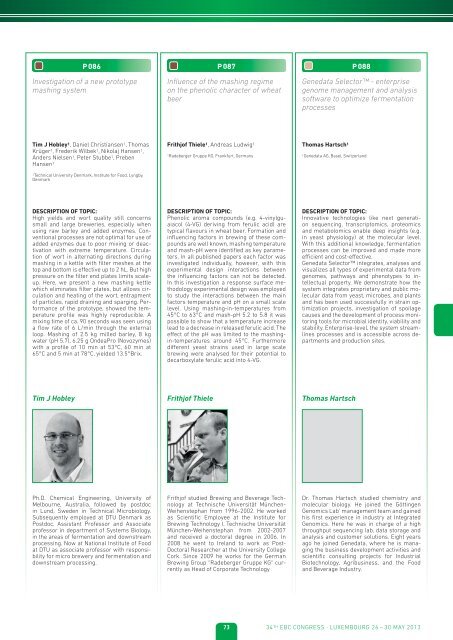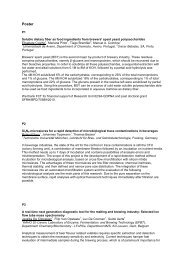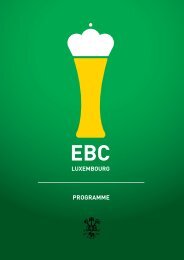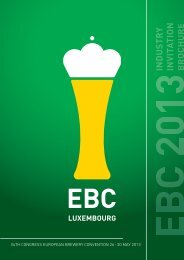please click here for download. - the 34th European Brewery ...
please click here for download. - the 34th European Brewery ...
please click here for download. - the 34th European Brewery ...
You also want an ePaper? Increase the reach of your titles
YUMPU automatically turns print PDFs into web optimized ePapers that Google loves.
P 086<br />
Investigation of a new prototype<br />
mashing system<br />
P 087<br />
Influence of <strong>the</strong> mashing regime<br />
on <strong>the</strong> phenolic character of wheat<br />
beer<br />
P 088<br />
Genedata Selector - enterprise<br />
genome management and analysis<br />
software to optimize fermentation<br />
processes<br />
Tim J Hobley 1 , Daniel Christiansen 1 , Thomas<br />
Krüger 1 , Frederik Wilbek 1 , Nikolaj Hansen 1 ,<br />
Anders Nielsen 1 , Peter Stubbe 1 , Preben<br />
Hansen 1<br />
1Technical University Denmark, Institute <strong>for</strong> Food, Lyngby,<br />
Denmark<br />
Frithjof Thiele 1 , Andreas Ludwig 1<br />
1Radeberger Gruppe KG, Frankfurt, Germany<br />
Thomas Hartsch 1<br />
1Genedata AG, Basel, Switzerland<br />
DESCRIPTION OF TOPIC:<br />
High yields and wort quality still concerns<br />
small and large breweries, especially when<br />
using raw barley and added enzymes. Conventional<br />
processes are not optimal <strong>for</strong> use of<br />
added enzymes due to poor mixing or deactivation<br />
with extreme temperature. Circulation<br />
of wort in alternating directions during<br />
mashing in a kettle with filter meshes at <strong>the</strong><br />
top and bottom is effective up to 2 hL. But high<br />
pressure on <strong>the</strong> filter end plates limits scaleup.<br />
Here, we present a new mashing kettle<br />
which eliminates filter plates, but allows circulation<br />
and heating of <strong>the</strong> wort, entrapment<br />
of particles, rapid draining and sparging. Per<strong>for</strong>mance<br />
of <strong>the</strong> prototype, showed <strong>the</strong> temperature<br />
profile was highly reproducible. A<br />
mixing time of ca. 90 seconds was seen using<br />
a flow rate of 6 L/min through <strong>the</strong> external<br />
loop. Mashing of 2.5 kg milled barley, 8 kg<br />
water (pH 5.7), 6.25 g OndeaPro (Novozymes)<br />
with a profile of 10 min at 53°C, 60 min at<br />
65°C and 5 min at 78°C, yielded 13.5°Brix.<br />
DESCRIPTION OF TOPIC:<br />
Phenolic aroma compounds (e.g. 4-vinylguaiacol<br />
(4-VG) deriving from ferulic acid) are<br />
typical flavours in wheat beer. Formation and<br />
influencing factors in brewing of <strong>the</strong>se compounds<br />
are well known, mashing temperature<br />
and mash-pH were identified as key parameters.<br />
In all published papers each factor was<br />
investigated individually, however, with this<br />
experimental design interactions between<br />
<strong>the</strong> influencing factors can not be detected.<br />
In this investigation a response surface methodology<br />
experimental design was employed<br />
to study <strong>the</strong> interactions between <strong>the</strong> main<br />
factors temperature and pH on a small scale<br />
level. Using mashing-in-temperatures from<br />
45°C to 63°C and mash-pH 5.2 to 5.8 it was<br />
possible to show that a temperature increase<br />
lead to a decrease in released ferulic acid. The<br />
effect of <strong>the</strong> pH was limited to <strong>the</strong> mashingin-temperatures<br />
around 45°C. Fur<strong>the</strong>rmore<br />
different yeast strains used in large scale<br />
brewing were analysed <strong>for</strong> <strong>the</strong>ir potential to<br />
decarboxylate ferulic acid into 4-VG.<br />
DESCRIPTION OF TOPIC:<br />
Innovative technologies like next generation<br />
sequencing, transcriptomics, proteomics<br />
and metabolomics enable deep insights (e.g.<br />
in yeast physiology) at <strong>the</strong> molecular level.<br />
With this additional knowledge, fermentation<br />
processes can be improved and made more<br />
efficient and cost-effective.<br />
Genedata Selector integrates, analyses and<br />
visualizes all types of experimental data from<br />
genomes, pathways and phenotypes to intellectual<br />
property. We demonstrate how <strong>the</strong><br />
system integrates proprietary and public molecular<br />
data from yeast, microbes, and plants<br />
and has been used successfully in strain optimization<br />
projects, investigation of spoilage<br />
causes and <strong>the</strong> development of process monitoring<br />
tools <strong>for</strong> microbial identity, viability and<br />
stability. Enterprise-level, <strong>the</strong> system streamlines<br />
processes and is accessible across departments<br />
and production sites.<br />
Tim J Hobley<br />
Frithjof Thiele<br />
Thomas Hartsch<br />
Ph.D. Chemical Engineering, University of<br />
Melbourne, Australia, followed by postdoc<br />
in Lund, Sweden in Technical Microbiology.<br />
Subsequently employed at DTU Denmark as<br />
Postdoc, Assistant Professor and Associate<br />
professor in department of Systems Biology,<br />
in <strong>the</strong> areas of fermentation and downstream<br />
processing. Now at National Institute of Food<br />
at DTU as associate professor with responsibility<br />
<strong>for</strong> micro brewery and fermentation and<br />
downstream processing.<br />
Frithjof studied Brewing and Beverage Technology<br />
at Technische Universität München-<br />
Weihenstephan from 1996-2002. He worked<br />
as Scientific Employee at <strong>the</strong> Institute <strong>for</strong><br />
Brewing Technology I, Technische Universität<br />
München-Weihenstephan from 2002-2007<br />
and received a doctoral degree in 2006. In<br />
2008 he went to Ireland to work as Post-<br />
Doctoral Researcher at <strong>the</strong> University College<br />
Cork. Since 2009 he works <strong>for</strong> <strong>the</strong> German<br />
Brewing Group “Radeberger Gruppe KG“ currently<br />
as Head of Corporate Technology<br />
Dr. Thomas Hartsch studied chemistry and<br />
molecular biology. He joined <strong>the</strong> Göttingen<br />
Genomics Lab‘ management team and gained<br />
his first experience in industry at Integrated<br />
Genomics. Here he was in charge of a high<br />
throughput sequencing lab, data storage and<br />
analysis and customer solutions. Eight years<br />
ago he joined Genedata, w<strong>here</strong> he is managing<br />
<strong>the</strong> business development activities and<br />
scientific consulting projects <strong>for</strong> Industrial<br />
Biotechnology, Agribusiness, and <strong>the</strong> Food<br />
and Beverage Industry.<br />
73 34 TH EBC CONGRESS · LUXEMBOURG 26 – 30 MAY 2013





